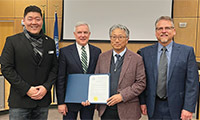{한글 해석] Does Adding Fish Bits To Juice Make It Better?
Off the coast of Peru swim billions of sardines and anchovies: oily, smelly little fish, rich in nutritious omega-3 fatty acids. Their spot on the food chain is low; many will be caught, ground up and fed as fishmeal to bigger animals.
But a few have a more exalted destiny: to be transported, purified and served at North American breakfast tables in the form of Tropicana Healthy Heart orange juice and Wonder Headstart bread. These new products promise to deliver the health benefits of fish oil without the smell and the taste - without, in fact, the fish.
The possible benefits of eating omega- 3s include cardiovascular protection and improved neural development in children.
However, “People just aren’t eating salmon or sardines twice a day,” said Ellie Halevy, director for marketing of Tropicana, which is owned by PepsiCo. “But they will drink two glasses of orange juice, if it has no fishy taste and all the benefits.”
Orange juice laced with anchovies is one example of the latest way major food companies are competing for health-conscious consumers: plugging one food into another and claiming the health benefits of both. Shoppers are offered green tea extracts in their ginger ale, yogurt bacteria in their salsa and powdered beets in their peanut butter.
Companies like LycoRed, a global provider of compounds pulled out of tomatoes that grow in greenhouses in Israel, produce a range of additives for the food industry. “Everybody already knows that a tomato is healthy,” said Udi Alroy, the company’s chief marketer.
Specially bred tomatoes, bright red and flavorless, are pulped and then treated to extract the valuable compounds of lycopene, beta-carotene and lutein - which are then encapsulated in “beadlets” so tiny they cannot be felt by the human tongue.
But whether the nutritional benefits of the original foods survive in additive form is still to be determined.
“Whether a tomato is good for you, that’s one thing,” said David A. Kessler, a former commissioner of the federal Food and Drug Administration. “Whether the lycopene in a tomato is good for you, that’s another. And then whether synthetic lycopene and microencapsulated lycopene are also good for you, that’s yet another thing.”
These additives are often called nutraceuticals, broadly defined as ingredients that are derived from food, and that offer health benefits associated with that food. Now Kraft, Dannon, General Mills and many other companies are adding nutraceuticals to existing foods: “fat-burning waffles” made from a newly developed corn flour, cheese that kills intestinal parasites, even ketchup that regulates digestion, are on the shelves or in development.
“One day, we believe, you will be able to walk into a supermarket and all the products could be enriched with omega- 3s: milk, yogurt, tortillas,” said Ian Lucas, head of marketing for Ocean Nutrition Canada, maker of the fish oil used by Tropicana.
What would this mean for food and human nutrition- “This whole area is far more complex than we thought just one or two years ago,” said Alice H. Lichtenstein, a professor of nutrition science and policy at Tufts University in Massachusetts.
There is significant scientific agreement on the benefits of certain nutrients, including calcium, fiber, folate, soy protein, omega-3 fatty acids, lactic acid bacteria and a few others. In food, these have proved to help protect against specific diseases , and many nutritionists believe that they are beneficial in supplement form.
However, recent studies on supplemental vitamin E, beta-carotene and folate (all of which fall into the broad category of “antioxidants”) surprised everyone by showing no benefits whatsoever for cardiovascular disease.
“There is a great deal we don’t know about how the compounds in food are made available to the body,” Dr. Lichtenstein said. “Now we have to be more cautious about individual nutrients, though we should not close our minds, given the successes of the past.”
생선 조각을 주스에 넣으면 더 좋아질까?
페루 해변에는 수십억 마리의 정어리와 멸치가 헤엄친다: 기름지고, 비린내가 나는 작은 생선들은 오메가 3 지방산과 같은 영양이 풍부하다. 먹이 사슬에서 그들의 자리는 하위 계층이다; 대부분은 잡히면 갈아서 물고기 밥 혹은 더 큰 동물들의 먹이로 사용된다.
하지만 요즘 이들 중 작은 일부는 좀 더 상승된 운명을 갖는다; 운반돼서 정제된 뒤 트로피카나 헬시 허트 오렌지주스와 헤드스타 빵이라는 형태로 미 북부지방의 아침 식탁에 서브되는 것이다. 이 같은 새로운 상품들은 생선 비린내와 맛 없이도 생선기름의 영양을 전달한다고 약속한다-사실 생선 자체가 없이 말이다.
오메가 3 지방산을 섭취함으로써 얻을 수 있는 효과는 심장혈관의 보호 및 어린이의 신경계 발달을 개선해 주는 것들을 포함한다.
그러나 “사람들은 연어나 정어리를 하루에 두 번씩 먹지 않습니다” 펩시코 소유사인 트로피카나의 마케팅 디렉터인 엘리 할레비가 말했다. “하지만 만약 이 주스에 생선 맛이 나지 않으면서도 생선의 모든 영양을 다 지녔다면 사람들은 이 오렌지주스를 매일 두잔씩 마실 것입니다”
멸치가 함유된 오렌지주스는 최근 건강을 염려하는 소비자들을 유치하기 위한 음식 회사들의 경쟁 방법 중 한 가지 예다: 하나의 음식을 다른 음식에 집어넣은 뒤 그 두 가지 음식 모두의 영양과 효과를 강조하는 것이다. 소비자들은 생강 맛 맥주에 녹차 추출물을 넣는 것, 살사에 들어간 요거트 발효군, 피넛 버터에 들어간 비트 파우더 등을 맛보게 됐다.
이스라엘의 그린하우스에서 자라는 토마토에서 추출한 합성물을 세계 곳곳에 공급하는 라이코레드와 같은 회사들은 음식업계를 위해 다양한 종류의 식품 첨가물을 생산한다.
“모든 사람이 토마토가 몸에 좋은 음식이라는 것을 이미 알고 있습니다” 이 회사의 판매과장인 우디 알로이가 말했다.
특히 밝은 붉은색에 플레이버가 없는 브레드 토마토는 라이코펜과 베타카로틴, 루틴-카로틴과 루틴-의 진귀한 합성물을 추출하기 위해 펄프로 만들어져 처리된 뒤 인간의 혀로는 느낄 수 없을 만큼 아주 작은 캡슐에 넣어진다.
그러나 이같은 첨가물의 형태로 만들어진 음식들이 원래 음식의 영양학적 효과를 고스란히 지니는지 여부는 아직도 명확하지 않은 상태다.
“토마토가 몸에 좋은지 아닌지, 그것은 하나의 별개 사항입니다” 연방 식품의약국의 전 의원인 데이빗 A. 케슬러가 말했다. “토마토에 들어있는 라이코펜이 몸에 좋은지 아닌지의 여부, 그것은 다른 별개의 사항입니다. 그리고 합성 라이코펜이나 미소캡슐화 된 라이코펜이 몸에 좋은지 여부, 그것은 또 다른 별개의 사항입니다”
이같은 첨가물들은 대체적으로 음식에서 추출된 재료로서 그 음식이 제공하는 영양효과를 제공한다고 알려지면서 건강식으로 자주 불린다. 지금 크래프트와 다농, 제너럴 밀스 등 많은 다른 음식회사들도 현존하는 음식들에 건강식을 추가하고 있다: 최근 개발된 장에 있는 기생충을 죽이는 옥수수 밀가루와 치즈로 만든 “지방을 분해하는 와플”, 소화를 돕는 케첩 등이 마켓 진열대를 장식하거나 혹은 개발 중이다.
“언젠가, 우리가 생각하기에, 수퍼마켓에 가면 오메가 3를 강화한 모든 종류의 음식을 만나게 될 것입니다: 우유, 요거트, 토티야 까지요” 트로피카나에 사용되는 생선 기름 제조업체인 오션 뉴트리션 캐나다의 마케팅 부장인 아이안 루카스가 말했다.
이 사실이 음식과 인간의 영양에 의미하는 바는 무엇인가?
“이 모든 분야는 우리가 1~2년 전 생각하던 바보다 훨씬 복잡해졌습니다” 매서추세츠의 터프트 대학의 영양과학과 영양제도학 교수인 앨리스 H. 리츤스차인이 말했다.
칼슘이나 식이섬유, 폴산, 콩 단백질, 오메가 3 지방산, 라틱산 유산균 등 몇 개 성분을 포함한 어떤 영양들의 효과에 대해서는 주목할 만한 과학적 동의가 있다.
이들 영양소는 음식을 통해 섭취했을 때 특정 질병을 예방하는 것이 증명됐고, 또 다른 영양소들은 이를 지지하는 형태로 혜택을 주는 것으로 알려졌다.
그러나 최근 연구에 따르면 비타민 E, 베타 보충제-카로틴과 폴산(이들 모두는 항산화제라는 거대한 카테고리에 포함된다) 심장계 질환에 아무런 혜택을 주지 못하는 것으로 밝혀져 모두를 놀라게 한 바 있다.
“음식에 함유된 합성물질이 몸에 어떤 식으로 흡수되도록 만들어지는지 우리가 모르는 바가 많습니다” 리츤스타인 박사가 말했다. “이제 우리는 각각의 영양성분에 대해 더 주의를 기울여야 합니다. 하지만 과거의 성공을 보았을 때 너무 마음을 닫지는 말아야 하겠지요”
<줄리아 모스킨 기자>
<어휘해설>
▲cardiovascular: 심장혈관계
▲neural development: 신경계 발달
▲ale: 맥주
▲additives: 첨가물
▲synthetic: 인공, 인조의
▲intestinal parasites: 장에 있는 기생충
스마터리빙
more [ 건강]
[ 건강]이제 혈관 건강도 챙기자!
[현대해운]우리 눈에 보이지 않기 때문에 혈관 건강을 챙기는 것은 결코 쉽지 않은데요. 여러분은 혈관 건강을 유지하기 위해 어떤 노력을 하시나요?
 [ 건강]
[ 건강]내 몸이 건강해지는 과일궁합
 [ 라이프]
[ 라이프]벌레야 물럿거라! 천연 해충제 만들기
 [ 건강]
[ 건강]혈압 낮추는데 좋은 식품
[현대해운]혈관 건강은 주로 노화가 진행되면서 지켜야 할 문제라고 인식되어 왔습니다. 최근 생활 패턴과 식생활의 변화로 혈관의 노화 진행이 빨라지고
사람·사람들
more
[한인단체 신년 인터뷰] LA 평통 장병우 회장… “본연 역할로 한반도 평화 실질 기여”
민주평화통일자문회의 LA협의회(이하 LA 평통) 장병우 회장은 6일 본보와의 신년 인터뷰에서 붉은 말의 해인 병오년 새해를 맞아 신년 화두로 …

워싱턴주에 첫 한인 시의장
워싱턴주에서 첫 한인 시의회 의장이 탄생했다. 제이슨 문(한국명 문태원) 머킬티오 시의원이 새해 들어 시의장으로 선출되며 또 하나의 중책을 맡…
국회 방문단 대한인국민회 방문
윤후덕·이해식·김한규 의원과 조오섭 국회의장 비서실장 등 10여 명의 한국 국회방문단이 지난 5일 LA를 찾아 로즈데일 묘지와 국민회관 등 미…
[한인단체 신년 인터뷰] 명원식 파바월드 회장… …
“한인 차세대들이 바르게 자랄 수 있는 토대를 만드는 것이 제가 파바월드의 회장으로 존재하는 유일한 이유입니다”한인사회의 대표적 청소년 봉사 …
LA한인회 멘토 프로그램 10일 스티브 강 위원장
LA 한인회(회장 로버트 안)가 한인사회 차세대 인재양성 노력의 하나로 ‘멘토를 만나다’ 프로그램을 정례화해 실시하고 있는 가운데 그 세 번째…
많이 본 기사
- 불법이민자 단속 ‘총격사망’에 트럼프 이민정책 반발 재점화
- 트럼프 “주택담보대출채권 2천억달러 매입…주택비용 낮아질것”
- 비상계엄은 내란인가…형사판단 나올 尹… 1
- 험악했던 美·콜롬비아 관계 반전…콜롬비아 “정상회담 준비”
- 상·하원서 공화당 ‘반란표’ 속출…트럼프 장악력 위기?
- 트럼프 “대만 관련 무슨일 할지는 시진핑 결정…공격않길 희망”
- “中, 희토류 日수출허가 심사 중단…산업 전반에 적용”
- 빅터차 “’트럼프 관세’ 위법 판단시 한미간 더 큰 불확실성”
- 트럼프, 나토연계 기구도 탈퇴… “대러 하이브리드전 방어 약화”
- NASA, 우주비행사 건강문제로 우주정거장 임무 단축…최초 사례
- 뉴저지주 ‘최악의 독감시즌’ 환자 급증
- 이민단속국 총격 여성 사망에 시위 확산…충돌·긴장 고조
- 머스크, 韓인구절벽 또 경고… “북한군 그냥 걸어 넘어오면 돼”
- ‘국민 배우’ 안성기 오늘 영면…명동성당서 추모 미사·영결식
- “오픈AI 공익추구 약속 기만” 머스크 소송, 배심원 재판 앞둬
- 포틀랜드서 또 이민당국 요원이 총격…2명 병원 이송
- 한국계 美의원들 “한국계 미국인의 유… 1
- 뉴저지한인회, 신임 임원진 인준
- ICE 요원 총격… 시민권자 여성 사… 5
- 연예계 은퇴합니다..돌연 충격 선언한 조윤우·소희·이태임
- 구글 공동창업자도 오라클 회장도…탈캘리포니아?
- 단추·핀 이용한 거대한 설치작업
- 美각료 “美의 베네수 제재위반 배 나포 보며 北 무슨 생각할까”
- [스키 기고] 초보자의 수난과 고수의 허세
- 뉴욕증시, 시총 4조달러 눈앞에 둔 알파벳…혼조 마감
- 컴퓨터 전공·로스쿨 졸업생들도‘취업난’극심
- “공업용 실리콘을 얼굴에”..故 선풍기 아줌마, 충격적인 성형 부작용[꼬꼬무]
- 시애틀~인천노선운항 항공사 1개 줄듯...국토교통부 대한항공 대체항공사로 알래스카항공 최종 결정
- 부통령 “유럽, 그린란드 관련 트럼프 진지하게 받아들여야”
- 초강경 이민단속, 아시아계도 큰 타격 3
- D-SNP 한인 가입자들, 그로서리 혜택 놓친다
- 탁재훈·신정환, 드디어 컨츄리꼬꼬 재회.. “또 잡힌 겁니까?”[노빠꾸]
- 팰팍 타운 77만달러 적자 놓고 정치권‘충돌’
- 케빈 김 주한 미 대사대리 전격 이임
- 덴마크·그린란드, 美 ‘그린란드 회담’ 수락에 “환영”
- 브로드웨이 뮤지컬 공연을 반값에…
- 애난데일서 뺑소니 사고 보행자 중태…제보 기다려
- ‘맥립’에 갈비고기 없다 맥도널드 허위광고 소송
- 유엔, 올해 세계경제 성장률 2.7% 전망…한국은 1.8%로 예상
- [독자 투고] 땅 끝 마을 파타고니아… 2
- 이주자 텍사스 몰린다 가주는 유입자 최하위
- “게이더스버그 지부 10일 개소해요”
- ‘美 정복’ 손흥민, 케인·메시·음바페와 어깨 나란히... ‘올해의 팀’ 공격수 부문 후보 등극
- [오세정 칼럼] 병오년 새해, 한국의 과제
- “주택 부족, 워싱턴 경제 위험 초래”
- LAX 무인열차 6월엔 개통되나
- 다운 사이징), 작은 집이 주는 큰 자유!!
- [발언대] L.A. 갈비의 유래
- “모든 소송 철회하고 내분사태 원만히 해결하길”
- 은퇴준비를 더 이상 미루면 안되는 이유
1/5지식톡

-
 미 육군 사관학교 West Poin…
0
미 육군 사관학교 West Poin…
0https://youtu.be/SxD8cEhNV6Q연락처:wpkapca@gmail.comJohn Choi: 714-716-6414West Point 합격증을 받으셨나요?미 육군사관학교 West Point 학부모 모…
-
 ☝️해외에서도 가능한 한국어 선생님…
0
☝️해외에서도 가능한 한국어 선생님…
0이 영상 하나면 충분합니다!♥️상담신청문의♥️☝️ 문의 폭주로 '선착순 상담'만 진행합니다.☎️ : 02-6213-9094✨카카오톡ID : @GOODEDU77 (@골뱅이 꼭 붙여주셔야합니다…
-
 테슬라 자동차 시트커버 장착
0
테슬라 자동차 시트커버 장착
0테슬라 시트커버, 사놓고 아직 못 씌우셨죠?장착이 생각보다 쉽지 않습니다.20년 경력 전문가에게 맡기세요 — 깔끔하고 딱 맞게 장착해드립니다!장착비용:앞좌석: $40뒷좌석: $60앞·뒷좌석 …
-
 식당용 부탄가스
0
식당용 부탄가스
0식당용 부탄가스 홀세일 합니다 로스앤젤레스 다운타운 픽업 가능 안녕 하세요?강아지 & 고양이 모든 애완동물 / 반려동물 식품 & 모든 애완동물/반려동물 관련 제품들 전문적으로 홀세일/취급하는 회사 입니다 100% …
-
 ACSL 국제 컴퓨터 과학 대회, …
0
ACSL 국제 컴퓨터 과학 대회, …
0웹사이트 : www.eduspot.co.kr 카카오톡 상담하기 : https://pf.kakao.com/_BEQWxb블로그 : https://blog.naver.com/eduspotmain안녕하세요, 에듀스팟입니다…
케이타운 1번가
오피니언
 이상희 UC 리버사이드 교수 인류학
이상희 UC 리버사이드 교수 인류학 오렌지 상자와 함께하는 2026년
 오세정 서울대 물리천문학부 명예교수·전 총장
오세정 서울대 물리천문학부 명예교수·전 총장 [오세정 칼럼] 병오년 새해, 한국의 과제
 존 안 / LA 거주
존 안 / LA 거주 [독자 투고] 땅 끝 마을 파타고니아 여행 유감
 이리나 수필가
이리나 수필가 [윌셔에서] 레디 코어(Ready Core)의 해를 맞으며
 이영창 / 한국일보 논설위원
이영창 / 한국일보 논설위원 [지평선] 67년생 현역 축구선수 미우라

[왈가 왈부] “이혜훈 청문회까지 지켜봐야”… 국민 눈높이에 맞나요
 정숙희 논설위원
정숙희 논설위원케네디에 관한 네 개의 이야기
 마크 A. 시쎈 / 워싱턴포스트 칼럼니스트
마크 A. 시쎈 / 워싱턴포스트 칼럼니스트 [마크 A. 시쎈 칼럼] 트럼프의 20가지 업적
 김동찬 시민참여센터 대표
김동찬 시민참여센터 대표 [미국은 지금] 2026년 ‘손님’ 의식 버리고 ‘주인’ 입장을
1/3지사별 뉴스

팰팍 타운 77만달러 적자 놓고 정치권‘충돌’
뉴저지 팰리세이즈팍 타운정부가 지난해 77만5,000달러 재정적자가 발생한 것을 두고 정치권이 강하게 충돌하면서 지역 한인사회가 술렁이고 있다…
뉴욕 등 5개주 연방아동보육예산 지원 전격 중단

‘연방 하원 민주·상원 공화’가능성 커
올해 11월3일 미 전역에서 중간선거가 실시된다. 이번 선거에서는 연방 하원 전체 435석과 함께 연방 상원 100석 가운데 35석을 새로 선…
“주택 부족, 워싱턴 경제 위험 초래”

베네수 이어 그린란드…트럼프, 2년차 벽두부터 美우선주의 거친 질주
2026년 새해 벽두부터 도널드 트럼프 대통령의 행보가 심상치 않다.집권 2기 2년차를 맞아 자신과 지지층의 이념이라 할 ‘미국 우선주의’ 구…
중부 캘리포니아 ‘한인 이민사’ 나왔다

오늘 하루 이 창 열지 않음 닫기 


















































.png)


댓글 안에 당신의 성숙함도 담아 주세요.
'오늘의 한마디'는 기사에 대하여 자신의 생각을 말하고 남의 생각을 들으며 서로 다양한 의견을 나누는 공간입니다. 그러나 간혹 불건전한 내용을 올리시는 분들이 계셔서 건전한 인터넷문화 정착을 위해 아래와 같은 운영원칙을 적용합니다.
자체 모니터링을 통해 아래에 해당하는 내용이 포함된 댓글이 발견되면 예고없이 삭제 조치를 하겠습니다.
불건전한 댓글을 올리거나, 이름에 비속어 및 상대방의 불쾌감을 주는 단어를 사용, 유명인 또는 특정 일반인을 사칭하는 경우 이용에 대한 차단 제재를 받을 수 있습니다. 차단될 경우, 일주일간 댓글을 달수 없게 됩니다.
명예훼손, 개인정보 유출, 욕설 등 법률에 위반되는 댓글은 관계 법령에 의거 민형사상 처벌을 받을 수 있으니 이용에 주의를 부탁드립니다.
Close
x